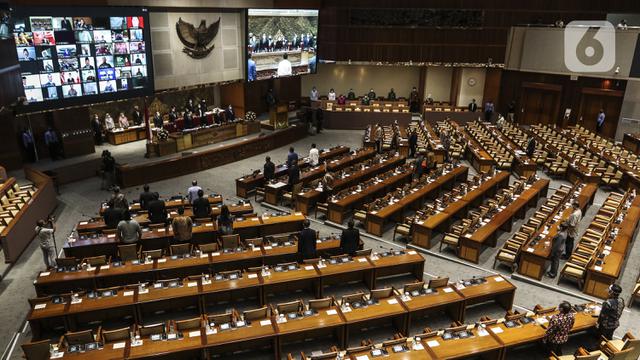Improvement of the Academic Manuscript of the Job Creation Law Offers Solutions to Multidimensional Problems
By: Raditya Rahman)*
The Constitutional Court (MK) has issued a ruling related to the Job Creation Act, in which the law must be revised because it is declared conditionally unconstitutional. However, the academic text of the revision of the Copyright Law will soon be completed, so that various problems will be resolved with the issuance of the Ciptaker Law.
Improvements made include the omnibus method as a definite, standard and standard method and method as well as the systematic formation of laws, then there are errors in references or quotations and typos (technical writing). In addition, the participation space for the community is also carried out optimally (meaningfull participation).
Elen Setiadi as Expert Staff for Regulation, Law Enforcement and Economic Resilience at the Coordinating Ministry for the Economy said that the Academic Paper (NA) and the Draft Law (RUU) for the revision of the Job Creation Law had now been prepared. The preparation of the Academic Manuscript and the draft of the Bill are discussed with the Expert Team/Academics. After the NA and the draft of the bill are completed, then the submission will be made to the DPR. Elen emphasized that the revision of the Ciptaker Law would fully refer to Law Number 13 of 2022 concerning the second amendment to Law Number 12 of 2011 concerning the Establishment of Legislation.
Elen said that the target for the completion of the revision of the Job Creation Law was to follow the time corridor that had been decided by the Constitutional Court, which was no later than 2 years since the Constitutional Court’s decision which was read out on November 25, 2021. He said, the sooner the better, by paying attention to the global situation and developments of the 5C multidimensional crisis, namely covid, climate change, commodity price instability, conflict, cost of living.
Meanwhile, in the context of strengthening community involvement and participation, the Job Creation Law Task Force with Ministries/Institutions (K/L) continuously disseminates the implementation of the Job Creation Law to the community and stakeholders. All responses and public views on the Job Creation Law, including its implementation, must be recorded and explained, including whether or not it can be considered.
The Constitutional Court’s decision does not actually annul the Job Creation Act, but is conditionally unconstitutional. So that the government has the opportunity to improve the job creation law. As for the revision of the Job Creation Act, it can be related to the substance of the universal sweeping policy. However, Piter considered that in addition to substance, the drafting procedure also needs improvement in relation to public involvement to improve the Job Creation Law.
The reason is that when it was passed into law, many parties felt that the job creation law did not involve public participation. Improvements in all aspects are indeed needed in the revision of the Job Creation Law. However, Piter assesses that it does not mean that the discussion or preparation is carried out from the beginning. Apart from the pros and cons, he added, the Job Creation Law is highly expected to improve the investment climate, so that it can increase investment which in turn can encourage economic growth.
Therefore, in order to increase the effectiveness of the Job Creation Law, the government should improve the Job Creation Law as a whole and involve as many components of the community as possible in the improvement process.
Until now, the government has issued 45 Government Regulations (PP) which technically regulate the ease of business licensing, empowerment of cooperatives and MSMEs, taxation, Bumdes, implementation of housing and residential areas and flats, etc. All of these regulations are in the interests of the business world and remain in effect, thus the business and investment climate will remain conducive.
The Job Creation Act is a regulation that the government has been waiting for. This is because the revision of the Job Creation Law is expected to accelerate the recovery of the national economy, which is currently facing many challenges from global developments.
Through the Job Creation Law, the government also continues to encourage increased investment and economic growth through regulatory reforms in the field of business licensing. These reforms are aimed at solving investment barriers, namely long bureaucratic chains, overlapping regulations and convoluted regulations.
One of the positive sides of the Job Creation Law is that it is easy to build a company, if in the past to build a company a minimum of Rp 50 million was needed, then with the Job Creation Act, this regulation is abolished. The DPR and the government will review a number of substances that have been objected to by many community groups.
As a follow-up, the DPR and the government have agreed to include a revision of the law related to the formation of legislation and the revision of the Job Creation Law in the priority national legislation program in 2022 and this is an administrative requirement of the legislation.
With this seriousness, of course,
